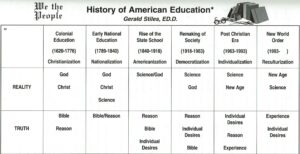 In the mid-1900s there was a battle taking place among Christians concerning the Bible. I remember reading Harold Lindsell’s book, The Battle for the Bible, in 1978. Lindsell’s book addressed the issue that was at the heart of the battle at the time – the inerrancy of Scripture. Bible scholar, J. Otis Yoder, summed up the importance of inerrancy this way.
In the mid-1900s there was a battle taking place among Christians concerning the Bible. I remember reading Harold Lindsell’s book, The Battle for the Bible, in 1978. Lindsell’s book addressed the issue that was at the heart of the battle at the time – the inerrancy of Scripture. Bible scholar, J. Otis Yoder, summed up the importance of inerrancy this way.
Biblical inerrancy means the Bible contains no error. It is without error in faith and fact. If we have the self-disclosure of the holy God, it cannot be mixed with error. Error and truth cannot be contained in the same document which claims to be a self-disclosure of a holy, righteous God. If error is mixed with truth, then that is deception which violates the character of God.
The reason this was so important is that there were those in Christianity who claimed that the Bible was infallible but not necessarily inerrant. The Bible was believed to be true and without error when it speaks to spiritual matters, but may contain mistakes in other matters such as geology, history, or science.
Lindsell argued that if the Bible was inspired by God it had to be inerrant. He wrote,
However limited may have been their knowledge, and however much they erred when they were not writing sacred Scripture, the authors of Scripture, under the guidance of the Holy Spirit, were preserved from making factual, historical, scientific, or other errors . . . God the Holy Spirit by nature cannot lie or be the author of untruth. If the Scripture is inspired at all it must be infallible.
Over the past couple of decades, I have witnessed another battle over the Bible slowly percolating among many Christians. This battle is not over inerrancy but over the sufficiency of Scripture. Sufficiency of Scripture is primarily based on these two passages.
And that from a child thou hast known the holy scriptures, which are able to make thee wise unto salvation through faith which is in Christ Jesus. All scripture is given by inspiration of God, and is profitable for doctrine, for reproof, for correction, for instruction in righteousness: That the man of God may be perfect, thoroughly furnished unto all good works. 2 Timothy 3:15-17 (KJV)
Beloved, when I gave all diligence to write unto you of the common salvation, it was needful for me to write unto you, and exhort you that ye should earnestly contend for the faith which was once delivered unto the saints. Jude 1:3 (KJV)
Piper puts it this way.
In other words, the Scriptures are sufficient in the sense that they are the only (“once for all”) inspired and (therefore) inerrant words of God that we need, in order to know the way of salvation (“make you wise unto salvation”) and the way of obedience (“equipped for every good work”).
When one believes that the Bible is sufficient, it doesn’t mean that we don’t have to read anything else to live our lives. It means that we don’t and can’t find any more special revelation. Again, John Piper sums it up by writing,
We don’t need any more inspired, inerrant words. In the Bible God has given us, we have the perfect standard for judging all other knowledge.
It is Piper’s last statement that I see at the crux of this battle over the sufficiency of Scripture. God’s Word is the perfect, final standard for judging all other knowledge. This means that we must look at all other knowledge through the lens of the inspired, inerrant Word of God.
A subtle shift has taken place in Christianity here in North America that I am very concerned about. It is very similar to the shift that took place in American education over the years. This shift was captured in a chart that I included in my book, Kingdom Education. You will find a portion of that chart below.
 In the early days of American education, ultimate truth was found in the Bible. Any human reasoning that was taught was always in subjection to God’s Word. Then, a subtle shift started taking place. The Bible and human reason became equally important in determining truth. Later, human reasoning became the primary source of finding truth and the Bible was seen as a secondary source. Today, truth is determined by the individual and his/her experience. If it isn’t experienced by the individual, then it isn’t true!
In the early days of American education, ultimate truth was found in the Bible. Any human reasoning that was taught was always in subjection to God’s Word. Then, a subtle shift started taking place. The Bible and human reason became equally important in determining truth. Later, human reasoning became the primary source of finding truth and the Bible was seen as a secondary source. Today, truth is determined by the individual and his/her experience. If it isn’t experienced by the individual, then it isn’t true!
This same thing is happening in today’s church. The Bible, on its own, is no longer being seen as what is needed to understand life and how to live it. God’s Word is not sufficient; we must look to other sources in order to really understand truth.
Again, I am not proposing that we don’t need to read and study other books. I am saying that the Bible must be seen as the only perfect standard for judging all other knowledge. Any other books must always be interpreted through the truth of Scripture. We should never use man’s wisdom to interpret the Bible.
However, there are growing instances taking place that indicate that the church does not really believe that the Bible is sufficient. In order to understand the physical universe’s origin, we have to add evolution to the biblical account of creation. One organization says its mission is to invite the church and the world to see the harmony between science and biblical faith as we present an evolutionary understanding of God’s creation.
There is a growing tendency to turn to such things as Critical Theory and books like, White Fragility, to deal with the sin of prejudice. However, God’s Word is sufficient to teach us that God has created each and every person as an image bearer of Himself. One’s gender, color of skin, family, etc. are all an act of a sovereign God, who is not a respecter of persons.
Even in Christian education, the temptation is to take research, or the latest methodology and then add the Bible to it in an effort to justify it. Instead, we should build our educational philosophy and practice on the truth of God’s Word. Then, we can evaluate data, best practices and curriculum through the lens of the sufficiency of Scripture.
If I really believe that the Bible is the inspired infallible, inerrant, sufficient Word of God, it, alone, provides me with everything I need to love God and love other people as I live to glorify Him in all I think, say and do. Again, let me refer what Paul wrote to young Timothy.
All scripture is given by inspiration of God, and is profitable for doctrine, for reproof, for correction, for instruction in righteousness: That the man of God may be perfect, thoroughly furnished unto all good works. 2 Timothy 3:15-17 (KJV)
Warren Wiersbe explains this so well when he wrote that the Bible is profitable for what is right (doctrine), what is wrong (reproof), how to get right (correction), and how to stay right (instruction in righteousness). If I believe this, then I can go to God’s Word and address any and every issue that I might face in this sinful world I live in.
It is not enough to believe that the Bible is inspired and, therefore, inerrant. We must be convinced that it is sufficient and all we need to equip us for a life of faith and service. The question for each of us is this. Is the Bible enough?

There’s a presumptive folly in opting for exceptions to biblical authority. For example, when someone makes a statement like, ‘The Bible is authoritative except in it’s teachings about marriage, or gender, or abortion’, the person who makes such a statement takes God’s place as final arbiter on what’s right or wrong. That does two very destructive things. First it diminishes perceptions of the real God because in essence it says, ‘the God of Scripture isn’t capable
of leaving an accurate record of Himself, His only Son and his standards for living’. (That raises the obvious question is ‘”How can anyone worship a God like that?”) Second, it makes the speaker into a kind of ‘Super god’, at least in his own mind, because his newly coined ‘infallible wisdom’ supersedes the wisdom of the Bible – a wisdom that has been revered as inerrant for millennia. The “You will be like God” temptation from Genesis is still very potent.